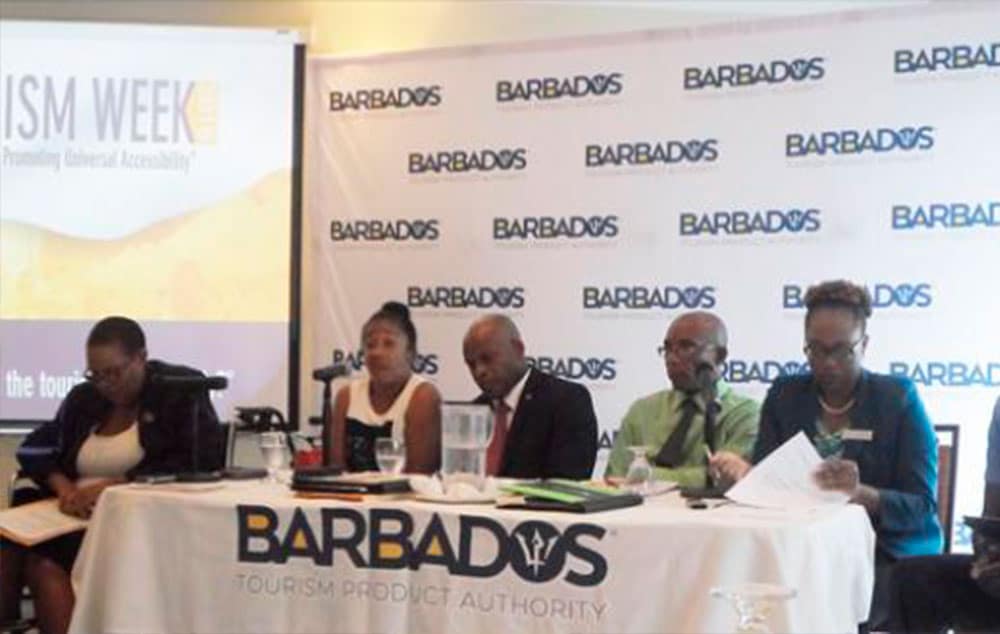Local officials have suggested that Barbados could be losing out on hundreds of visitors and crucial tourism dollars from the disabled community because the island is not fully ready to cater to their needs.
And they are warning tourism officials as well as government to move with haste in putting the necessary legislation and policies and procedures in place to better accommodate locals and visitors with disabilities.
The concern was raised during the Barbados Tourism Product Authority’s (BTPA) Accessible Barbados Symposium panel discussion on the topic Universal Access: Is the Tourism Sector Ready? at the Courtyard by Marriott hotel on Friday.
It is estimated that approximately two million people with disabilities travel worldwide each year.
Michael Holder, managing director and owner of Blessed Rentals, a company that transports people with disabilities, said the traveling disability community was a niche area that Barbados should be tapping into.
However, Holder, who did not mince his words, said the island was simply not fully accessible to accommodate them, adding that the government “really do not care about those with disability”.
His comments came following a revelation by attorney-at-law Edmund Hinkson that several pieces of legislation with pending amendments to better accommodate and protect people with disability were yet to go before Parliament for approval and that Barbados was “in breach” of a UN convention on people with disability since it had ratified the convention but had no law in place.
“When Mr. Hinkson spoke I listened carefully and I wonder to myself, are we really ready in Barbados? . . . At the end of the day the government is who run the country. They do not care about disabled persons,” said Holder.
“For me, if you really care you are going to implement these laws. You are not going to let them drag on for years. You are going to cut that red tape which the council for the disabled face, which Sunshine faced when they were bringing in the new vehicles,” he said, adding that he too had issues with getting duty free vehicles imported for use to transport people with disability.
Holder further stated out that while there were about five Transport Board buses for the disabled, only one or two were working at any one time, a situation that had resulted in students missing school for periods of up to two weeks.
“This might sound a little harsh but maybe it would take one of them [government ministers] to have their relatives disabled for them to say ‘you know what, we need to do something about it’,” said Holder, agreeing that the attitude of others toward people with disability needed to change.
Turning his attention to the tourism industry Holder singled out taxi operators, questioning if the industry was adequately equipped to accommodate people with disability.
“There is a big tourist market for disabled persons to come to Barbados but we are not ready. First of all when they come to the airport the regular taxis are there and they walk up to them and say ‘we gine lift you’,” said Holder.
Stating that Barbados was in “a unique” position of being a year round tourist destination, administrative project officer at the Barbados Council for the Disabled Roseann Foster-Vaughan, said while she was pleased that some progress had been made to accommodate people with disability in the sector, Barbados was “not there yet”.
Admitting that she would prefer to reside in Europe where the conditions for people with disability was better, Foster-Vaughan said visitors coming to the island needed to know that their needs were being met.
“You know what is the biggest thing that is keeping us from moving ahead, is the attitude of the people. That is the biggest barrier that we as persons with disability and persons who travel that is what we face on a daily basis,” said Foster-Vaughan.
There are no figures to show the number of visitors with disability that comes to Barbados each year.
However, BTPA’s manager of innovation and strategy Terry Vanderpool-Fox assured members of the disabled community that their cries had not fallen on deaf ears, pointing out that although the organization was just over one-year-old, it was aware of the needs and Friday’s symposium was a start in addressing them.
“We see our role as part of the facilitators to see that things get down. So your call has been heard and we will certainly agitate as much as we can,” assured Vanderpool-Fox. (MM)
Source: Barbados Today



